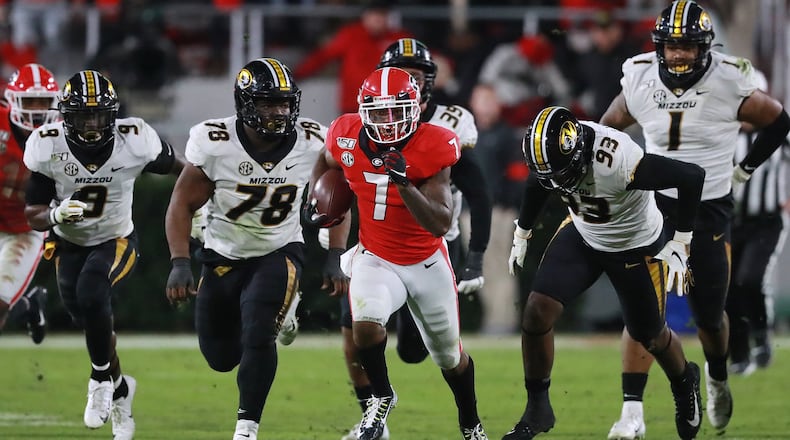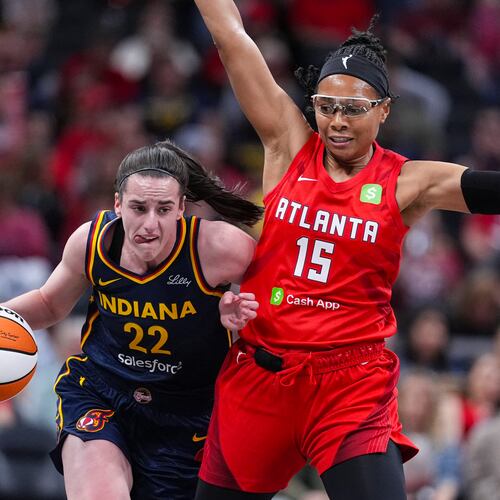Imagine for a moment how many lives could be changed for the better if the NCAA did indeed allow payment to college athletes.
Even if you’re among those who see athletic scholarships as payment enough, this could be huge.
That isn’t to say that athletic scholarships are a small thing. There’s nothing small about getting a free college education. I know because my husband and I struggled mightily to finance our daughters’ education.
But when I think about my niece Casey and her son Jaylin, the aspiring NBA player in the family, and how any amount of additional income could make a difference for them, I get goose pimples.
People who know more about the workings of the NCAA have expressed some skepticism about the association’s decision, announced late last month, to allow college athletes the rights over their own names and likenesses, and I get it.
For one thing, there were no specifics. And for another, they don’t actually say anything about money.
As one sports columnist put it, “it’s the organization’s classic signature, that blowhardy nothingness.”
Whether we can trust the NCAA to actually do anything or not, there are a lot of people who like me believe these athletes should definitely get paid.
“Considering the amount of time they put into their craft while coaches’ and athletic directors’ salaries balloon to millions of dollars annually is disturbing to say the least,” said Shaun M. Anderson, faculty adviser for the Institute for Business Ethics and Sustainability at Loyola Marymount University, whose work examines corporate social responsibility within sports organizations. “My concern, however, is how much of the profits will go to all athletes? Only those student-athletes who participate in high-revenue generating sports like football and men’s basketball earn major profits for their university. How soon will athletes from other sports want in on this pay structure?”
RELATED | Kirby Smart: NCAA needs to assure a ‘level playing field’
Kim Miloch, a professor at Texas Woman’s University and a sports management expert, said the announcement is essentially a way for the NCAA to mediate legislative and public pressure, and in turn, give its member institutions time to determine parameters for implementation.
According to Miloch, recent figures indicate the NCAA generates about $1 billion in revenue, 85% of which stems from its Division I basketball television contract. As a result, it makes sense for them to open the door for student-athlete compensation.
“In the short term, member institutions will struggle with how to implement this new paradigm,” Miloch said. “For student-athletes, this will have both short- and long-term benefit.”
My sentiment exactly.
Miloch said that about 16% of student-athletes are black, and 38% of student-athletes are first-generation students, meaning neither parent attended college.
“In general, first-generation college students, including those that are student-athletes, are more likely to encounter financial challenges on the path to graduation,” she said. “For these athletes and others, the ability to profit from their name, image or likeness represents an additional source of income to support themselves and the cost of attendance.”
If there’s a downside, this is it. Since it is not considered financial aid, athletes should expect to be taxed on that income like the rest of us.
Bruce B. Siegal, a local attorney with decades of experience in licensing and protection of colleges and sports properties, doesn’t doubt the NCAA Board of Governors’ sincerity and believes it signals a significant turning point for the organization.
But even he admits the devil is in the details.
RELATED | NCAA creates path to allow athletes to benefit from ‘name, image and likeness’
“At this point, there remains much to flesh out, as the NCAA’s announcement does not contain policies or procedures that will ultimately need to be in place to govern the actual licensing, sponsorship and endorsement process,” Siegal said. “That being said, at the end of the day, there is a process in place to move forward, and I believe it will.”
I asked Siegal what he thinks should happen.
Credit: The Atlanta Journal-Constitution
Credit: The Atlanta Journal-Constitution
The Working Group of the NCAA Board of Governors, he said, should continue pursuing its outreach to its constituents and obtain feedback.
In addition, Siegal said, Division I, Division II and Division III should promptly create any new rules on names, images and likenesses, perhaps even sooner than the January 2021 deadline.
“Meanwhile, the various states will continue to pursue legislation similar to the California bill, rather than to take a ‘wait-and-see’ approach,” he said. “The NCAA is closely monitoring the approaches taken by state governments and the U.S. Congress, and is considering all potential next steps. The NCAA should take full advantage of its window of opportunity to assume the lead.”
Considering California’s “Fair Pay to Play” act being signed into law and the fact that other states are pursuing similar laws, Loyola Marymount’s Anderson believes the NCAA will be forced to follow through.
And they absolutely should.
I can’t help thinking what a huge impact it would have on so many players’ and their families’ lives, many of whom come from single-parent households like my nephew Jay.
“They and their families often go without their basic needs met,” Anderson said, “so this will be a huge help for those who can earn the income.”
Find Gracie on Facebook (www.facebook.com/graciestaplesajc/) and Twitter (@GStaples_AJC) or email her at gstaples@ajc.com.
About the Author
Keep Reading
The Latest
Featured





